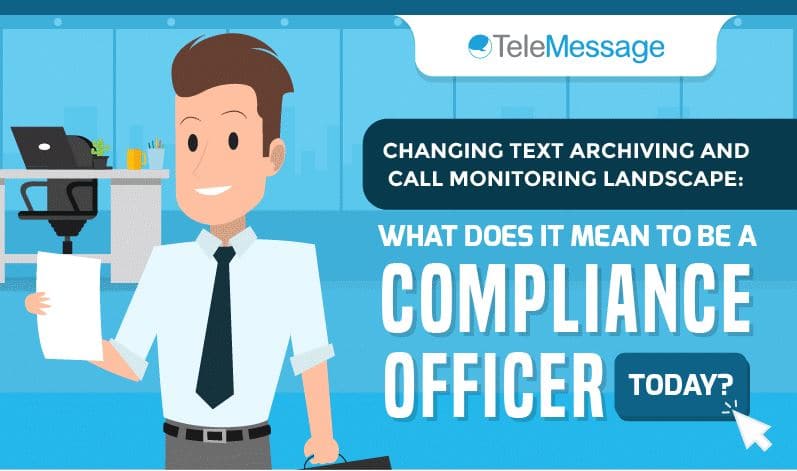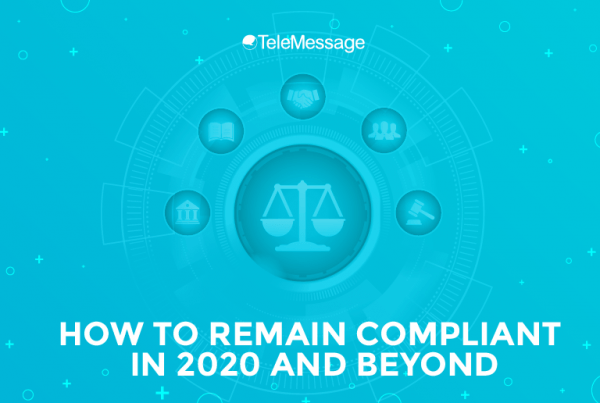To say that it is a “challenging” time for corporate communication compliance officers is putting it mildly. Compliance – both as a function and company culture – has grown more complex in recent years, with changing employee behavior and shifting technological makeup being the primary drivers.
Call Monitoring Requirements
Combined with recent misconducts for using various mobile channels for illegal activities, these factors have motivated both corporate executives and key regulators to demand that compliance officers demonstrate more control over internal communications within the organization – more specifically, tighter text archiving rules and a more efficient system for call monitoring.
As a result, compliance officers are wearing new hats and initiating cross-division collaboration to effectively monitor and mitigate risks surrounding communication compliance.
 Vague Compliance Objectives Due to Changing Regulations
Vague Compliance Objectives Due to Changing Regulations
One of the crucial issues of concern to communication compliance professionals around the world now is the rapid rise of new laws and regulations which have upended their existing systems and practices.
One example is the General Data Protection Regulation (GDPR), which requires companies in and outside the European Union processing EU citizens’ data to obtain user’s consent prior to processing it, like before recording phone calls. Another example is the new and amended MiFID II rules for call recording, which requires companies to capture phone calls in the highest quality possible.
These new laws present a real challenge for compliance officers not only because they challenge their present technological capabilities, but also by muddling their chain of command. Because these regulations include overlapping privacy and archiving mandates, it’s difficult for chief compliance officers to delegate the job to the right person with sufficient expertise and experience in both subjects.
Taking Geopolitics and Sanction Compliance Into Consideration
Another factor that compliance professionals must account for when enforcing communication policies is the geopolitical situation in markets in which they are directly and indirectly involved.
With new alliances being formed and trade wars taking place, it is more imperative than ever for compliance officers to be aware of their business practices as well as of their partner organizations in other regions of the world.
From combating foreign or domestic threats to supporting local economic players, governments around the world have different motives for enforcing new legislation that benefits one party over another.
But regardless of what motivates these governments from establishing economic or politically-rooted legislation, it is the compliance officer’s duty to consider the risks they bring forth and perform due diligence on the communication protocols they have with partnering organizations situated in those regions.
Managing Cultural Risks
Aside from external factors, challenges within organization premises present the bulk of challenges facing today’s compliance officers. The contemporary workforce is composed of people spanning a variety of generations and ethnic backgrounds, resulting in cross-cultural issues that affect the efficiency of business communications.
One example of cultural risks compliance officers must address is the shifting preference of the new generation of workers from conventional email to texting. Some of the most noticeable influences of this shift involve the formality of language being used by employees when discussing business matters over text, as well as the complexity of understanding the context of a single text message, which most often can be traced to a series of phone calls, chats, and emails.
The goal of modern communication compliance officer is to address this risk by putting up the necessary policies that establishes acceptable use of mobile device and associated channels in the workplace, as well as by investing in the right solution that can help them monitor voice calls, text messages, emails, chats, and other mobile content in real time.
The TeleMessage Mobile Archiver effectively addresses compliance, regulatory, and eDiscovery response requirements and reduces risks for organizations that are required by the law and industry regulations to record and monitor phone calls.
Our solution is equipped with voice call archiving capabilities that capture and record employee mobile phone calls, as well as text messages, emails, WhatsApp chats, and other types of mobile communication. All the captured data is securely and reliably retained within TeleMessage servers or forwarded to an archiving data storage vendor of your choice.
Our mobile archiving products securely capture content from mobile carriers and mobile devices for a variety of ownership models (BYOD, CYOD, and employer-issued). With our multiple archiving solutions, you can always find the right tools or blend for your requirements:
TeleMessage offers cross-carrier and international mobile text & calls archiving for corporate and BYOD phones. Visit our website today at www.telemessage.com to learn more about our mobile archiving products.





